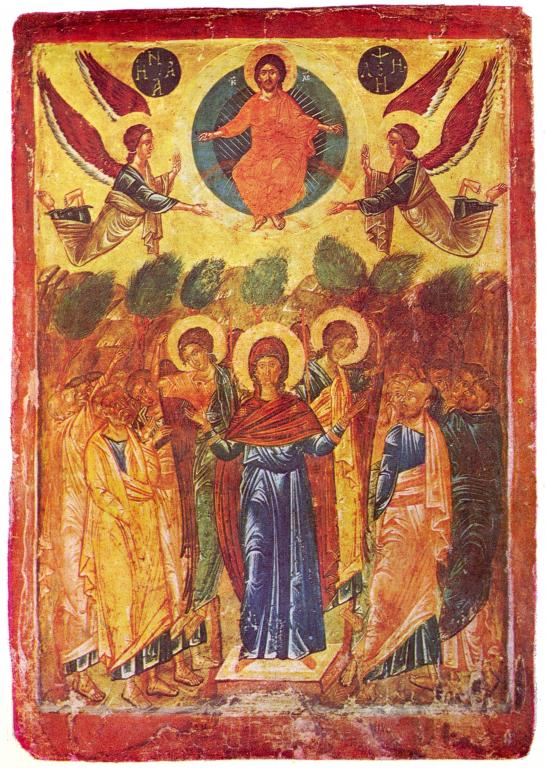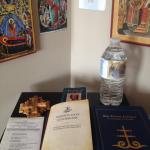
I was out with a friend who worships and works in the Latin Church last night. If you want to know what we were doing, we were seeing Hamilton. We liked it.
Over dinner, I mentioned to him that this was a great way of celebrating the leave-taking of Pascha. It was the end of the Pascha season for me last night on the Old Calendar. For me, Ascension Thursday is today. He is, of course, a week ahead of me on the calendar that our Kyivan Church considers ‘new,’ so he has already had the Feast of the Ascension last week. He mentioned, however, that because Ascension coincided with Mother’s Day, one parish whose mass he attended last Sunday – to which the Latins seem to have moved the celebration of the Ascension – didn’t even mention the feast. He had to attend a second mass to get his fix.
I just couldn’t do Pentecost without Ascension, he exclaimed. I agreed with him. Over Pascha season, I’ve been re-reading the Acts of the Apostles. I’m experimenting, if you wish to know, with what I call a guilt-free Bible reading program that gets me through the Scriptures through one year. It’s guilt-free because I’ve arranged it by the church seasons, and I basically say that I’ll read that book in that season without indicating what passages to read each day. This means that I never feel guilty about missing a day or two or even three.
What struck me as I read the Acts of the Apostles is that you really can’t have Pentecost without Ascension. Without the Ascension, there is no way that our Lord Jesus Christ is standing at the right hand of the Father ready to receive the Holy Protomartyr Stephen into his glory. It is the ascended Christ who not only pours out the Spirit upon the apostles, but also blinds Saul on the road to Damascus. Without Christ ascended into the heavens, the Holy Apostle Philip cannot be transported from one place to another, and the Ethiopian eunuch would not have heard the Prophecy of Isaiah interpreted for him.
My Latin friend was struck by this last insight. It was right to remind me, we agreed, of the experiences of the Prophet Ezekiel, who is taken up by the Spirit throughout his prophetic career and set down in different places. That kind of charismatic teleporting, though, hinges on the vision that opens the book. The Holy Prophet Ezekiel sees one like a son of man seated on a throne with four winged living creatures accompanying him with faces on all sides and eyes all around. Opening with this passage in the Fifty Spiritual Homilies, Holy Macarius the Great writes that this vision foreshadows the ‘mystery of the human soul’ that ‘is deemed to be worthy to participate in the light of the Holy Spirit by becoming his throne and habitation, and is covered with the beauty of ineffable glory of the Spirit, becomes all light, all face, all eye.’
All light, all face, all eye. Sam Rocha pointed me to this formulation in his book Folk Phenomenology when he closely reads the Greek Orthodox theologian Christos Yannaras’s Person and Eros. The insight for both Rocha and Yannaras is that the person in its Greek formulation is a prosopon, the one whose face is before the other. In personhood perfected in the Spirit, we literally become all light, all face, all eye. Influenced by this formulation, I chose the tagline a face facing others to describe what it means to be an ‘Eastern Catholic Person.’ I found the works of Macarius because many of the daily prayers for Orthodox laypeople are attributed to him. Lex orandi, lex credendi, as my Latin sisters and brothers would say – what I have been praying is what I believe.
But none of this spiritual perfection happens without the Ascension. The experiences of both the Holy Prophet Ezekiel and the Holy Apostle Philip are predicated on the Son of Man enthroned in glory. In the wisdom of the mothers and fathers of the church, this insight is finally confirmed in the first of the stichera we pray for the Vespers of the Ascension: The Lord ascended into heaven so that He could send the Comforter into this world. The heavens prepared his throne, and the angels marvelled at the sight of a human being more exalted and more glorious than themselves. Today he Father receives again in his bosom the One who was in Him from all eternity, and the Holy Spirit gives a command to all the angels: “Lift up your gates, O you Princes. O you nations of the earth, clap your hands, for Christ has gone up to the place where He had been from all eternity. Indeed, the second of the set is even more explicit about the Macarian formulation of the angels foreshadowing our transfiguration into all light, all face, all eye: O Lord, the cherubim were amazed at your ascension: they were dazzled as they beheld You, O God, rising upon the clouds higher than they could rise. We sing a hymn of praise to You: ‘Glory to You for your tender mercy.‘
Oh, and Hamilton was great. No doubt I will have more thoughts later, including some of my ambivalent musings of its portrayal of Alexander Hamilton as a model minority character. But it struck my friend and me that the musical was structured in a Christian way. Since it is history, there are no spoilers possible, so I will go right to the end. As students of American history know, Hamilton dies by the gun of Aaron Burr in a duel. In the play, the portrayal of his widow Eliza’s efforts to preserve his memory and to start an orphanage that she knows he’d be proud of culminates in the moment when she knows that she will meet him in the afterlife. He is not perfect – he is a workaholic, he cheats on her, he died in a duel – but she has not only forgiven him, but is also awaiting to see him in his final perfection. With her last breath, she catches a glimpse of him, and they are reunited. The stage goes dark. Is this not, I mused to myself, the bridge between the Leave-Taking of Pascha in which Christ harrows hell and bestows life to those in the tombs and the Ascension in which our Lord takes us, sinners though we have been, into the place where we are to each other all light, all face, all eye?












